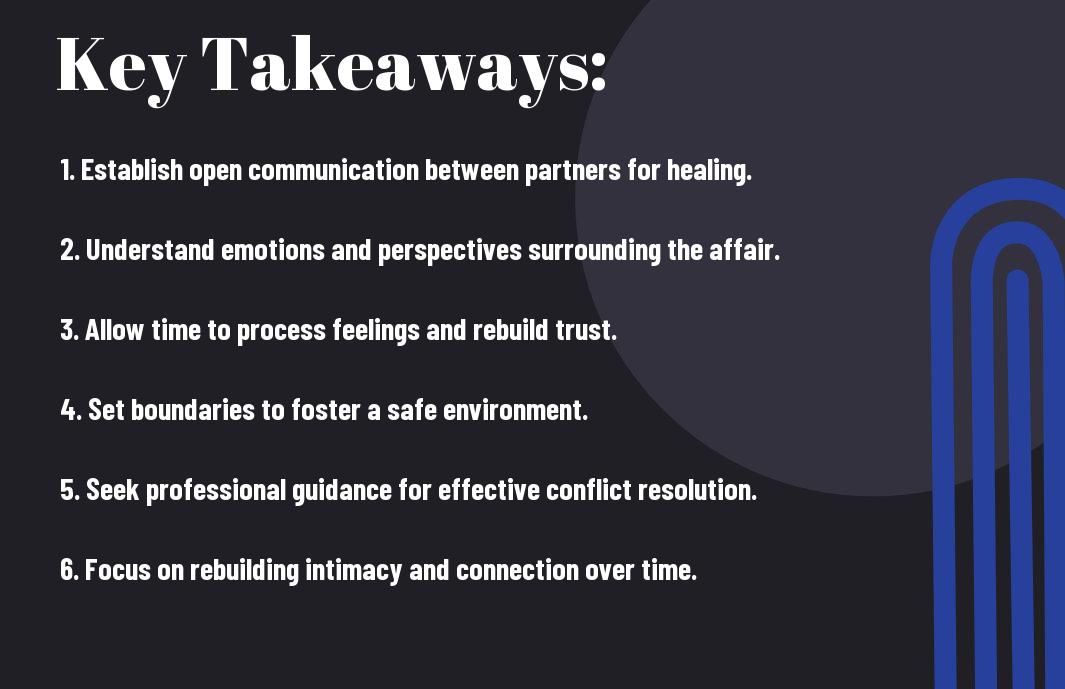You may be feeling a whirlwind of emotions following an affair that has shaken the foundation of your relationship. Understanding the complexities that come with infidelity is necessary as you seek guidance through marriage counseling. By addressing the underlying issues and fostering open communication, you can begin to heal and rebuild trust. This post will provide you with valuable insights into the counseling process, helping you navigate your feelings and paving the way for a healthier partnership.
Key Takeaways:
- Affairs can cause deep emotional wounds, and healing requires time and open communication between partners.
- Establishing a safe space for sharing feelings and experiences is crucial for rebuilding trust.
- Understanding the underlying issues that led to the affair is vital for preventing future betrayals.
- Professional counseling can offer strategies and tools to help couples navigate their feelings and rebuild their relationship.
- Honesty about emotions, fears, and expectations can facilitate a more productive healing process.
- Setting clear boundaries and agreements will help both partners feel secure as they work through the healing process.
- Forgiveness takes time and may require effort from both partners to foster and maintain a supportive environment.

Understanding Infidelity
For many, infidelity is a devastating blow to trust and intimacy in a relationship. Understanding the complexities behind why affairs happen can provide insight into your own situation. It’s important to recognize that infidelity often stems from unmet needs, personal issues, or emotional disconnect. Gaining a deeper understanding of these triggers can be the first step toward healing, allowing you to address the underlying issues and rebuild trust.
The Emotional Impact of an Affair
Affair impacts can vary widely but often lead to intense feelings of betrayal, loss, and confusion. You may experience a mix of anger, sadness, and anxiety as you grapple with the reality of an affair. This emotional turmoil is completely natural and important to process as you navigate through this challenging time.
Types of Affairs
Types of affairs can be categorized into several groups, each with unique motivations and implications on your relationship:
| Romantic Affairs | Involve deep emotional connections. |
| Physical Affairs | Primarily sexual in nature, lacking emotional depth. |
| Emotional Affairs | Focus on emotional intimacy without physical engagement. |
| Cyber Affairs | Occur through online interactions, often anonymous. |
| Situational Affairs | Arise from specific circumstances, like work trips. |
Thou should assess your situation wisely, as each type of affair impacts your relationship differently.
Types of affairs can influence the healing process and your approach to repairing the relationship. Being aware of these distinctions can aid in understanding the motivations of the affair, leading to better communication and resolution. Here’s more to consider:
| Reasons for Affairs | May stem from issues like boredom or lack of emotional support. |
| Consequences of Affairs | Can lead to a breakdown of trust and emotional connection. |
| Path to Healing | Requires open dialogue and commitment from both partners. |
| Professional Help | Seeking counseling can provide guidance through recovery. |
| Future Steps | Focus on rebuilding trust and understanding each other. |
Thou must recognize the different types of affairs to navigate the complexities that may arise in your relationship effectively.
The Role of Marriage Counseling
There’s no denying that marriage counseling plays a significant part in the healing process after an affair. Seeking professional help can create a safe space for both partners to openly express their feelings, navigate their emotions, and work toward rebuilding trust. A skilled counselor provides guidance and strategies aimed at understanding the underlying issues in your relationship, facilitating constructive conversations, and creating a roadmap for a healthier future together.
Benefits of Counseling
Role of counseling in the aftermath of infidelity can be transformative. It helps you both establish clear communication, explore emotional pain, and identify patterns that may have contributed to the affair. With effective counseling, you gain tools to rebuild intimacy, restore trust, and foster a deeper emotional connection moving forward.
Choosing the Right Counselor
Role of selecting the right counselor for your situation is important to ensure a positive outcome. You should look for a professional with experience in dealing with infidelity and couples therapy. Consider their approach to healing, credentials, and references. It’s important to feel comfortable and safe with the counselor, as this will directly impact your willingness to open up and engage in the therapeutic process.
Indeed, the decision regarding the right counselor can define the course of your healing journey. You should prioritize finding someone who understands the complexities of affairs and specializes in relationship repair. Look for a professional who uses evidence-based techniques and actively listens to both partners. A strong rapport with your counselor can nurture an environment where both you and your partner feel supported and validated, ultimately enhancing the therapeutic experience and fostering a stronger relationship.
The Counseling Process
Despite the emotional turmoil that follows an affair, counseling can foster healing and connection. Engaging with a professional can provide a structured environment to explore feelings and guiding you toward rebuilding trust. For more insights, check out I’m a couples therapist specializing in infidelity work. AMA.
Initial Assessment and Goals
Along the first few sessions, your therapist will conduct an initial assessment to understand the dynamics of your relationship and the impact of the affair. Together, you will establish specific goals to address your unique situation, laying the groundwork for healing and growth.
Communication Techniques
For effective counseling, embracing communication techniques is necessary. These methods not only enhance understanding but also facilitate emotional expression, crucial for rebuilding your relationship.
Techniques such as active listening, “I” statements, and setting aside time for open dialogue can empower your discussions. Active listening encourages you to fully focus on your partner’s feelings, fostering empathy. Using “I” statements can help you express your feelings without blame, promoting a calmer atmosphere. Moreover, dedicating specific times to talk allows both partners to prepare emotionally, minimizing misunderstandings and reducing conflict. By integrating these methods, you set a strong foundation for rebuilding trust and intimacy.

Rebuilding Trust
Not all hope is lost after an affair; rebuilding trust takes time, effort, and commitment from both partners. You must acknowledge the emotional impact and create a safe environment where openness can thrive. It involves vulnerability, active listening, and consistent honesty while acknowledging past pain. As you both navigate this delicate journey, focus on transparency and strengthen your bond through shared experiences, ensuring the process is genuine and meaningful.
Steps to Regain Trust
One effective approach to regaining trust involves establishing open communication. This means discussing feelings, fears, and expectations without judgment. Each partner should express their needs and concerns, creating a platform for healing. Being consistent in actions and words will reinforce your commitment to each other and help build a resilient partnership.
Setting Boundaries
About setting boundaries, it’s necessary to define what is acceptable and what isn’t in your renewed relationship. Boundaries create a sense of safety and respect, making it easier for both partners to feel secure. By clearly outlining emotional, physical, and social limits, you can work together to rebuild trust and prevent future breaches.
Even as you establish these boundaries, remain mindful of their importance in fostering mutual respect. Clearly outlining what behaviors may harm your relationship, such as interactions with ex-partners or colleagues, helps prevent misunderstandings. Communicating openly about any insecurities allows both you and your partner to address issues together, reinforcing your commitment to trust. By adhering to these boundaries, you can start to feel the foundation of your relationship strengthen, paving the way for a deeper emotional connection.

Maintaining a Healthy Relationship
Once again, sustaining a healthy relationship requires commitment and dedication from both partners. After experiencing an affair, it’s crucial to rebuild trust and emotional intimacy, ensuring you both feel valued and secure. Regularly investing in your relationship through shared activities and open dialogue will cultivate a stronger bond, nurturing a deeper understanding of each other’s needs and desires.
Ongoing Communication Skills
Any relationship flourishes with ongoing communication skills. By actively practicing open, honest conversations, you can express your thoughts and feelings without fear of judgment. Establishing a safe space for dialogue encourages vulnerability and strengthens your connection, making it easier to resolve conflicts and share expectations.
Creating Shared Goals
Communication is key when it comes to establishing shared goals in your relationship. By identifying what you both want to achieve, whether that’s personal aspirations or mutual endeavors, you can develop a united vision for your future together.
Hence, creating shared goals aligns your individual paths and fosters a sense of teamwork. Working together toward common objectives enhances commitment and deepens your emotional connection. Setting these goals also allows you to celebrate achievements together, reinforcing positive patterns while encouraging mutual respect and collaboration. Make sure your goals are realistic and celebrate progress along the way, as this strengthens the foundation of your relationship.
Preparing for the Future
All couples have the ability to rebuild their relationship after an affair by focusing on the future. This process involves openly discussing your emotions, establishing clear expectations, and setting shared goals. By working together, you can create a roadmap that fosters trust and intimacy, ensuring that both partners feel valued and understood as you move forward.
Identifying Relational Patterns
At times, individuals fall into negative relational patterns that can contribute to conflict and disconnection. By identifying these patterns, you can gain insight into how your behaviors and communication styles have influenced your relationship. This understanding allows you to challenge these cycles and pave the way for healthier, more constructive interactions in the future.
Strengthening Commitment
Along your journey towards healing, it’s necessary to focus on strengthening your commitment to each other. This involves actively choosing to prioritize your relationship, building trust, and engaging in meaningful conversations about your future together. By reaffirming your dedication and expressing appreciation for each other, you lay a solid foundation for growth and healing.
Consequently, strengthening your commitment can deeply impact your relationship’s stability. Actively communicating your feelings, needs, and intentions creates a sense of security for both partners. By engaging in shared experiences, setting mutual goals, and consistently checking in with one another, you foster a profound emotional bond. Additionally, recognizing each other’s efforts and showing gratitude can significantly enhance relationship satisfaction. Bear in mind, fostering this commitment requires ongoing effort but can lead to lasting, positive change.
Conclusion
With these considerations, you can begin to navigate the complex journey of healing after an affair through marriage counseling. It’s imperative to foster open communication, establish trust, and work through emotions together. As you engage in this process, remain patient with yourself and your partner, recognizing that rebuilding your relationship takes time and effort. Embrace the potential for growth and a deeper connection as you both seek to move forward, stronger than before.
FAQ
Q: What is the first step in healing after an affair?
A: The first step in healing after an affair involves open and honest communication between partners. Both individuals need to express their feelings about the affair and its impact on their relationship. This includes discussing the reasons for the infidelity and acknowledging the hurt caused, which can help establish a foundation for rebuilding trust.
Q: How can marriage counseling help couples after an affair?
A: Marriage counseling provides a safe environment for couples to explore their emotions and thoughts about the affair. A trained therapist can facilitate discussions, help each partner understand their needs, and guide them towards healing. Counseling also offers tools and strategies to rebuild trust, improve communication, and strengthen the relationship moving forward.
Q: What are some common emotions experienced after an affair?
A: After an affair, individuals may experience a wide range of emotions, including anger, betrayal, sadness, guilt, and confusion. The partner who was unfaithful may feel remorse and anxiety about the future, while the betrayed partner may struggle with self-esteem and feelings of inadequacy. Acknowledging these emotions is a vital part of the healing process.
Q: How long does it typically take to heal from an affair?
A: The healing process varies for each couple and can take several months to years depending on the circumstances of the affair and the commitment of both partners to work through their issues. Consistent effort in counseling and personal growth is often necessary to rebuild trust and restore the relationship. Patience and understanding are key during this time.
Q: What steps can couples take to rebuild trust after an affair?
A: Rebuilding trust requires transparency and accountability from the partner who had the affair. This might involve sharing passwords, being open about their whereabouts, and consistently following through on commitments. Both partners should also engage in active listening and practice empathy towards each other’s feelings. Setting clear boundaries and rebuilding intimacy in small, gradual ways can also help restore trust over time.
